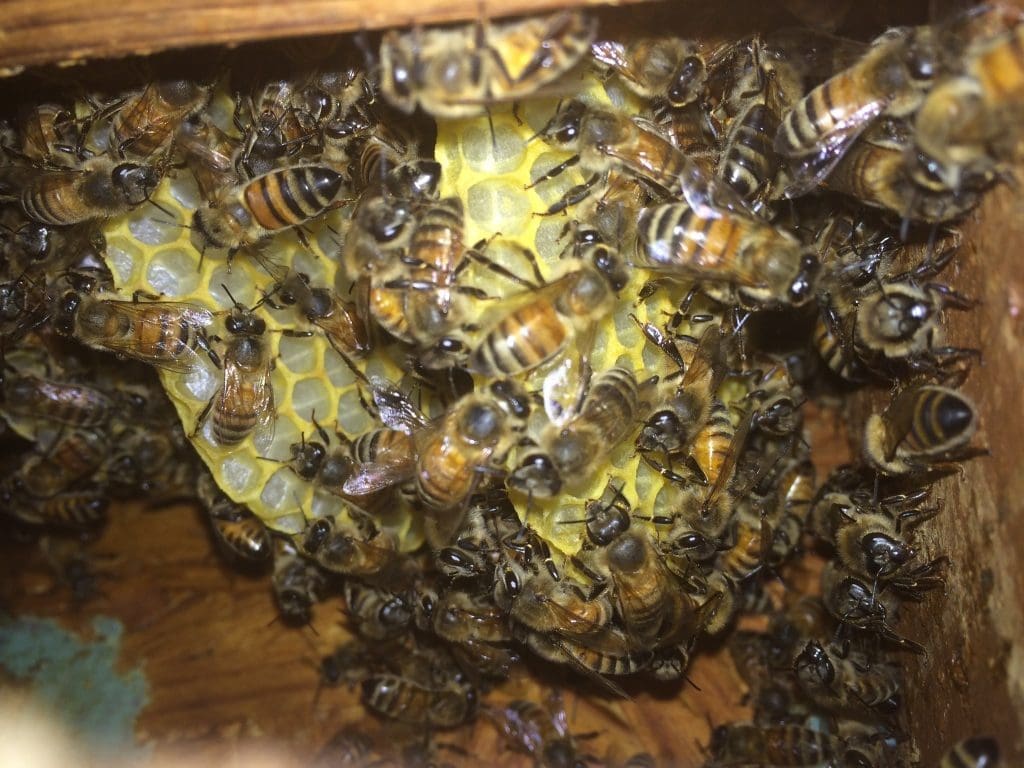

Our CERTIFIED Honeybee Hive Removal & Relocation
Southern Wildlife Management provides expert Honeybee Hive Removal services designed to safely and humanely protect your property and essential pollinators. Unlike exterminators, we carefully relocate honeybees from walls, attics, chimneys, and other structures using proven beekeeper methods. Removed hives are donated to local beekeepers, supporting bee populations and our ecosystem.
Honeybee infestations can lead to structural damage, attract pests, and cause honey buildup inside your property. Georgia law now requires anyone performing hive removal from structures to hold a Honeybee Hive Certification through the Georgia Department of Agriculture, ensuring safe removal practices. Our certified specialists deliver effective, eco-friendly removal and prevention services.
OUR PRICING INCLUDES a flat-rate base fee and an hourly rate, accounting for careful hive extraction and unknown factors such as hive size or difficult access locations. We prioritize minimally invasive techniques, providing temporary patches after removal, though homeowners handle final structural restoration. Trust our licensed, insured, and certified professionals for reliable honeybee removal. Contact Southern Pest Management today.
Call now for FAST & AFFORDABLE Honeybee Hive Removal Services
📞 (678) 935-5900
The Honeybee removal process
removal
After determining the fastest & most economical way to access the hive, we GENTLY and QUICKLY remove as many bees as possible without harming them. While the Queen is the priority, we need as many workers and as much comb as possible to make the relocation of the hive easier.
sealing
Once we have removed all of the bees within the structure, we seal up the entrance they were using. This means we tape up temporary plastic sheeting over the hole we cut on the inside and then on the outside we caulk the access point – if known. Problem solved!
We can Help!
📞 (678) 935-5900
“The way humanity manages or mismanages its nature-based assets, including pollinators, will in part define our collective future in the 21st century……The fact is that of the 100 crop species that provide 90 percent of the world’s food, over 70 are pollinated by bees.”
– Achim Steiner
🍯 Top 15 Honey Bee Hive Removal FAQs (Georgia)
Q) Do you kill the bees when removing a hive?
A) No! Our honey bee removal service focuses on live hive relocation, not extermination. We take great care to remove and transport honey bees safely to local beekeepers or apiaries.
Q) I found a beehive on my house — is it dangerous?
A) While honey bees are not naturally aggressive, they will sting to protect their colony. A hive near or inside your home poses a risk, especially for children or pets. We recommend professional bee removal as soon as you spot a hive.
Q) What’s the difference between honey bees and wasps?
A) Honey bees are fuzzy and docile pollinators, while wasps are smooth-bodied and more aggressive. Unlike wasps, honey bees die after stinging. If you’re unsure, we can identify the species before starting any removal.
Q) Do you offer honey bee removal in Alpharetta or Milton?
A) Yes! We proudly serve Alpharetta, Milton, Cumming, Johns Creek, and most of North Georgia with licensed, humane honey bee relocation services.
Q) Why are honey bees important to the environment?
A) Honey bees are essential pollinators for our food supply and agriculture. One colony can visit thousands of flowers per day, supporting biodiversity and crop health. Removing and relocating them helps preserve local ecosystems.
Q) Is it true honey bees can only sting once?
A) Yes. Only worker bees sting, and they die after stinging because their barbed stinger remains in the skin. Queen bees can sting multiple times but rarely leave the hive.
Q) What causes honey bees to build a hive inside walls or roofs?
A) Honey bees are attracted to warm, enclosed cavities—making attic spaces, walls, and soffits ideal. Once they find a dry entry point, they can build a thriving colony fast.
Q) Can honey bee hives cause damage to a home?
A) Yes. Honeycomb inside walls attracts pests and mold, and melting wax or dripping honey can ruin insulation or drywall. Prompt removal prevents long-term structural damage.
Q) Will the bees come back after the hive is removed?
A) Once we relocate the hive, we offer sealing and exclusion advice to prevent future colonies from returning to the same space. If wax or scent trails remain, scout bees may try to rebuild.
Q) When is swarm season for honey bees in Georgia?
A) Swarming typically happens from March to June, when hives become crowded and bees split off to start new colonies. If you see a large bee cluster, it’s likely a temporary swarm looking for a home.
Q) Do you handle swarms differently than full hives?
A) Yes. A swarm is often easier to relocate because it’s not yet built into the structure. These mobile clusters are collected quickly and rehomed, often without opening up walls or siding.
Q) How do honey bees communicate with each other?
A) Honey bees “dance” to share directions to nectar sources. This complex behavior, combined with over 170 odorant receptors, makes their communication system one of the most advanced in the insect world.
Q) What happens to the bees after removal?
A) We transfer healthy hives to local Georgia beekeepers or protected apiaries. This supports pollinator populations while safely removing the bees from residential or commercial areas.
Q) How fast can you respond to a bee problem?
A) We offer quick response to urgent bee removal calls. Same-day or next-day service is often available, especially during swarm season when timing is critical.
Q) Can I remove a honey bee hive myself?
A) We strongly advise against DIY bee removal. Agitating the hive can provoke mass stinging, and improper removal may leave honeycomb or queen scent behind. Always trust licensed bee removal professionals.
